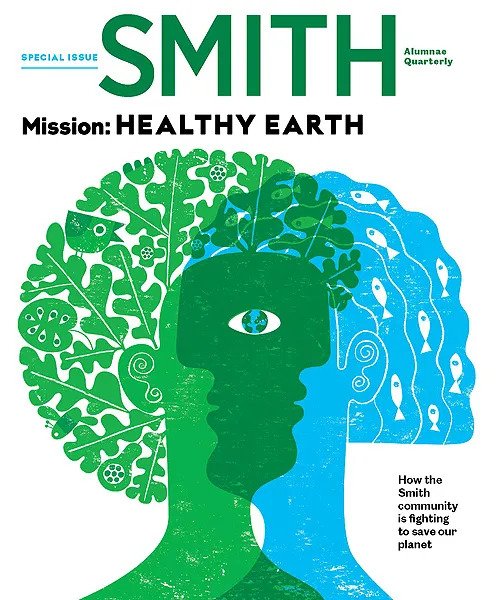I thought I was doing enough. But am I?
Alum News

Published March 26, 2020
Finally, the dissonance caught up with me.
Tune in and you’ll notice it everywhere. A dad wants the best for his young daughters, so he buys a new luxury, gas-powered car without even considering an electric vehicle. A loving grandmother flies every week to visit grandkids, which adds to the climate chaos that threatens their future. A middle school soccer team from California plays an away match—in the Czech Republic—and 15 families fly out for a long weekend, spewing about 105 metric tons of greenhouse gases just for the flights. Does it matter which team won? We all lost.
I told myself I was doing enough. I donated to environmental organizations. I took a class to learn how to reduce my carbon footprint; I got solar panels and an EV, refused plastic, composted and canceled much of my air travel. I proudly logged the reduction in my emissions.
But. I was still acting like the world as I knew it would continue. As though my leafy neighborhood would not be scorched and parched. As though my local Safeway would continue to be stuffed with an abundance of foods from all over the world. Then one day when I got a statement for the IRA I’d set up for my kids’ earnings, I noticed they were in a fund called “target retirement 2060.” The dissonance screeched so loudly that something snapped in me.
Between now and 2060 lies environmental devastation, social upheaval, violence and displacement on a scale that humanity has never before faced. The existence of this fund was unbearably poignant in its implicit, naïve assumption that we could make long-term financial plans as though our delicate web of civilization would remain largely the same.
I wasn’t doing enough. What would be my defense if and when this bus goes over the cliff? That I voted against the driver? That I held up a dignified hand to register my objection? Not good enough to satisfy my imagined judges: my kids, myself and every other living creature. I needed to be able to say that I kicked and bit and punched in the fight to grab the wheel.
It hurt to leave behind my sense of security, my belief that everything would be mostly OK, but there’s a satisfying clean sting in facing the truth. My husband and I decided to split our portfolio of effort: He focuses on career while I work on the climate crisis. I’d never imagined I’d give up my financial self-sufficiency, but the climate crisis demanded I sacrifice this narrative, and I did. That hurt, too.
In January 2019 I became a volunteer for Resilient Neighborhoods, the tiny nonprofit that had trained me in reducing my household carbon footprint. They asked me to work with a consultant and lead a team of volunteers in putting on the organization’s first-ever fundraiser. I’ve never played that role before but I’m still a Smithie; I know how to figure stuff out. I studied fundraising models, scripted presentations, coordinated other volunteers and managed every detail.
When they asked me to be the MC and the pitch person, I realized this would entail wearing Spanx. That raised the stakes. (We’d set a target of $5,000, but honestly, I don’t wear Spanx for less than $15K.) I reached out to donors to put together a challenge grant of $10,000, and ultimately we raised more than $25,000.
At the big event, when I was holding the mic in front of more than 100 people, I talked about my journey. I admitted that we all have to act like climate deniers at least some of the time, just to get by. Otherwise, we’d all just be holding each other and sobbing, and that won’t help. The only antidote to despair is action.
Individual actions matter. Your actions matter: quantitatively a little, emotionally a lot. Maybe you can’t quit your job, but can you abandon whatever else is keeping you from rising to the challenge of this climate crisis? Do it out of love for everything you care about—including yourself. And start right now.
Climate Actions We Can All Take
The world has changed. What can we do? Get tactical with these 10 actions.

1. Speak up! Politically and socially, be the change we need. Get inspired by Jane Fonda and her Fire Drill Fridays protests in Washington, D.C. Get radical with Extinction Rebellion, a global climate change protest group.
2. Power your home with renewable energy.
3. Insulate your home.

4. Transition to energy-efficient appliances—electric only!
5. Reduce water waste.
6. Eat all the food you buy.
7. Eat less meat.

8. Reduce your transportation footprint by using public transportation; or get a fuel-efficient or electric vehicle.
9. Cut back on flying and buy carbon offsets when you do. (Check out cooleffect.org.)
10. Invest in girls’ education. (This is No. 6 on the Drawdown list of 100 actions. See drawdown.org, where you’ll find online workshops that educate and inspire community and individual action.)
This story appears in the Spring 2020 issue of the Smith Alumnae Quarterly.
SMITH ALUMNAE QUARTERLY
Special Climate Issue

Mission: HEALTHY EARTH
How the Smith community is fighting to save our planet
SMITH ID
ANNE-CHRISTINE STRUGNELL ’84
San Rafael, California
WRITER and climate activist
MAJOR: English language and literature
FURTHER EDUCATION: Oxford University, second bachelor’s, English
Photograph by Jen Siska, Illustrations by Cristina Spanò